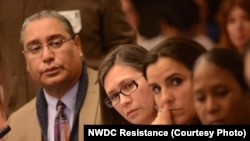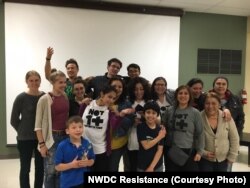Fearing violence in Mexico linked to political turbulence in the early 1990s, Maru Mora Villalpando came to the United States on a tourist visa.
"I used to go back and forth with a tourist visa," Villalpando said.
"Since I was going back and forth from Seattle (Washington) to Mexico, my idea was to stay in Mexico, but only because of the economic situation," she said as the North American Free Trade Agreement (NAFTA) promised a better future.
She also had aspirations to be part of something political in her home country.
"But then I saw the person who was supposed to be the next president being killed in front of hundreds of people. It made me realize that it was better for me to leave the country. For the kind of work I wanted to do, I imagined I would be killed as well," she said.
In 1996, she used her tourist visa for the last time to see her family. The year after, her daughter was born in Seattle and the 46-year-old community organizer, social activist and single mother became a visa overstayer.
"So I decided that I couldn't leave anymore."
Villalpando now falls under the 1996 Illegal Immigration Reform and Immigration Responsibility Act signed by former President Bill Clinton; if she were to leave the country, she could not come back for 10 years.
Problem of overstays
"While the White House focuses its border security rhetoric on building a wall along the southern border, attention and resources should be paid to issues like overstays," Democratic Rep. Filemon Vela of Texas said during a congressional hearing in Washington Tuesday.
Members of the House Homeland Security Subcommittee on Border and Maritime Security called overstays a gap in the nation's border security.
Vela said he knows "firsthand" the security challenges faced along the border, "but to keep our focus mainly on walls is a vulnerability in and of itself."
The subcommittee's chair, Republican Rep. Martha McSally of Arizona, said visa overstays "historically" have been the primary means for terrorist entry into the United States.
"Time and time again, terrorists have exploited the visa system by legally entering America. The 9/11 commission put it this way: for terrorists, travel documents are as important as weapons," she added.
On Monday, the Department of Homeland Security (DHS) reported that 544,676 people (1.07 percent of 50 million U.S. visitors) didn't leave when their visas expired during fiscal year 2016, didn't adjust their status (as would be the case of, for example, an asylum seeker who came as a tourist), and remained in the country at the end of the last fiscal year.
Michael Dougherty, DHS' acting assistant secretary for border, immigration and trade, told lawmakers he "personally" believes the government needs a "better means of communicating with people."
We're "looking towards pushing something out on your phone that says, 'Hey, you're almost done.' I think it would be nice if the sending countries would do the same thing. I know if I was on travel and the host country was telling me that it was about time to go, and my own government was telling me the same, that would motivate me to get going," he added.
Dougherty also said the U.S. needs to do a better job of understanding from the start whether people intend to stay.
U.S. security officials have not fully implemented a biometric entry/exit system that has been in the works since 2013, complicating how agencies track visa overstays.
DHS relies on biographic information from passenger manifests to document departures.
No hope for the future
In the meantime, people like Villalpando continue to live a day at a time.
"I don't really have a hope for the future. I mean, personally speaking, because as an undocumented person I always live day to day. I'm always thinking when is the last day I'm going to be with my daughter, when is going to be the day that ICE [Immigration and Customs Enforcement] is going to show up and detain me," Villalpando said.
"When people ask about hope, the thing that comes to my mind is thinking about all the people that I'm in touch with that I am really lucky to work with in the detention center and other places," she added.
Villalpando vowed to continue her social work in a group called NWDC Resistance that fights for improved conditions and better treatment for all undocumented immigrants held in the Northwest Detention Center in Tacoma, Washington.
"But now, in the movement, I do have the hope …we're going to dismantle the system. … I'm certain. I know it's going to take a long time. But I'm certain," she said.






